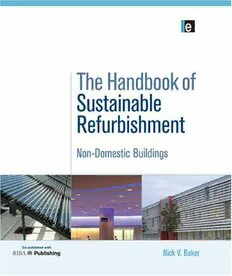
The Handbook of Sustainable Refurbishment: Non-Domestic Buildings PDF
185 Pages·2009·11.495 MB·English
Most books are stored in the elastic cloud where traffic is expensive. For this reason, we have a limit on daily download.
Preview The Handbook of Sustainable Refurbishment: Non-Domestic Buildings
Description:
The refurbishment of existing buildings is a neglected subject within sustainable architecture; attention is usually focused on new buildings. Old buildings can use large amounts of energy and provide poor internal conditions for occupants. They may have high heating demand, poor lighting, poor ventilation, solar penetration and glare, and poor control of heating and cooling. Demolition is an option but the alternative of refurbishment is starting to be seen as more sustainable in terms of architectural value, materials use, neighborhood disruption and waste disposal. Building new is more carbon intensive and carries many wider environmental impacts. In addition, the potential impact of low energy refurbishment is much greater than that for new build since there are many more existing buildings than will be built in the next 10 - 20 years, the period over which many CO2 emission targets apply. The Handbook of Sustainable Refurbishment: Volume 1: Non-Domestic Buildings offers architects, engineers and a wide range of building professionals practical advice, illustrated by real examples. It moves from principles of sustainable refurbishment to specific design and engineering guidance. It emphasizes the need for an integrated approach by showing how refurbishment measures interact with one and other, and with the occupants, and how performance is ultimately influenced by this interaction.
See more
The list of books you might like
Most books are stored in the elastic cloud where traffic is expensive. For this reason, we have a limit on daily download.
